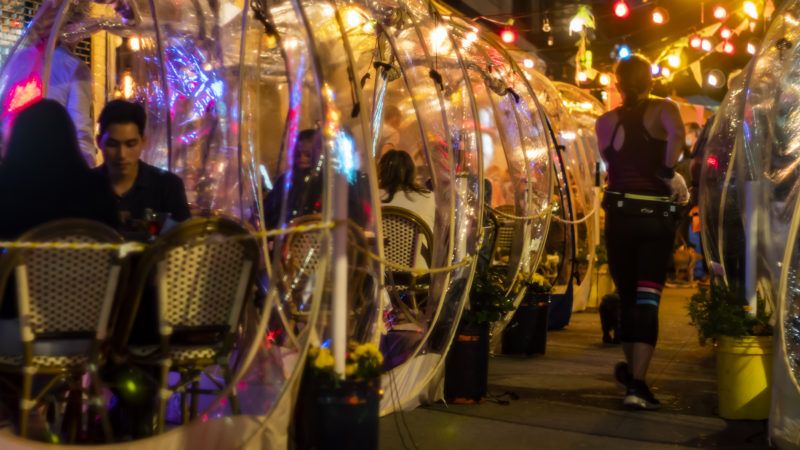Brooklyn Eatery Sues New York State and Gov. Cuomo Over Looming 'Food Curfew'
Limiting the hours during which food can be served is arbitrary, unscientific, and could cause overcrowding, the plaintiffs argue.

New York City is one of the world's dining capitals. It's also the city that never sleeps. Ergo, late night eats have long been part of the city's food culture. But that culture—and the restaurants that foster it—has been hammered by the COVID-19 pandemic and measures imposed by the city and state governments to limit the spread of the virus.
New York City suffered more than 23,000 COVID-19 deaths, but thankfully, overall rates of new COVID-19 cases have been decreasing in New York City for some time.
Now, both the city and state are taking embryonic steps to emerge from the pandemic and allow businesses to reopen in limited fashion. But New York City restaurants have found that the New York State rules for indoor dining in the city, which are set to take effect at the end of this month, impose not just tight restrictions on capacity but also on the hours that these businesses can stay open.
It's that latter issue—specifically, a midnight "food curfew" mandated by the state—that spurred one Brooklyn restaurant to sue the state earlier this month. That East Williamsburg restaurant, The Graham, is a cozy eatery that features everything from fried plantains to crispy D'Artagnan duck breast to avocado toast, a host of gorgeous cocktails, and a variety of weekend brunch options.
According to the lawsuit, filed on September 17 against Gov. Andrew Cuomo, the governor's rule and set to take effect next week, "require[s] that New York City restaurants close by midnight each night, despite the fact that coronavirus does not behave as a vampire, infecting others only when the moon is out." What's more, the restaurant argues the rule is arbitrary and "lacks any real or substantial relationship to stopping the spread of coronavirus."
"After 6 months of closure, Governor Cuomo has finally agreed to allow New York City to join the rest of the state, and rest of the country, in offering limited indoor dining at 25 percent capacity," says attorney Jon Corbett, who filed the lawsuit on behalf of The Graham in the U.S. District Court for the Eastern District of New York, in an email to me this week. "The state has not explained why this rule is necessary, why it is imposed on New York City and not the rest of the state, and why it continues to issue rules without working with its industry partners to solve problems."
Jack Sterne, a Cuomo administration spokesman, responding to questions about the lawsuit, said the measure was needed because "late-night service can encourage individuals to gather and mingle, increasing the risk of COVID transmission."
But the lawsuit both anticipated and poured cold water on that suspect notion. Cuomo's rule, the suit alleges, "actually makes the situation worse, as shrinking the hours during which New Yorkers can get a meal will result in more crowding during the fewer remaining hours."
The suit also declares Gov. Cuomo's new rule is just the latest in a series of seemingly arbitrary COVID-19 rules and head-turning reversals New York restaurants have faced over the past several months.
"For example, before the pandemic, food service establishments selling alcohol only needed to offer food for sale," the suit declares. "Then, pandemic rules required the sale of some food with every purchase of alcohol. Then, the Governor announced that full meals were required in order to purchase alcohol, declaring that traditional bar food items like chicken wings 'don't count.' Then, the SLA retreated on that, declaring that any foods more substantial than chips and popcorn will suffice."
(I blasted some of those same rules in a column last month.)
With any luck, unlike those whiplash-inducing alcohol rules, Cuomo's midnight food curfew will never take effect. That's because The Graham filed a separate request for an injunction, asking the District Court to halt enforcement of the rule, which is set to take effect on September 30, the date "indoor dining is allowed to resume in New York City restaurants at 25% capacity."
The rule is arbitrary and—whatever its intent—will harm struggling businesses without making New York City residents any safer.
"Absent a compelling explanation," Corbett says, "we look forward to a retraction of the rule." I do, too.


Show Comments (109)